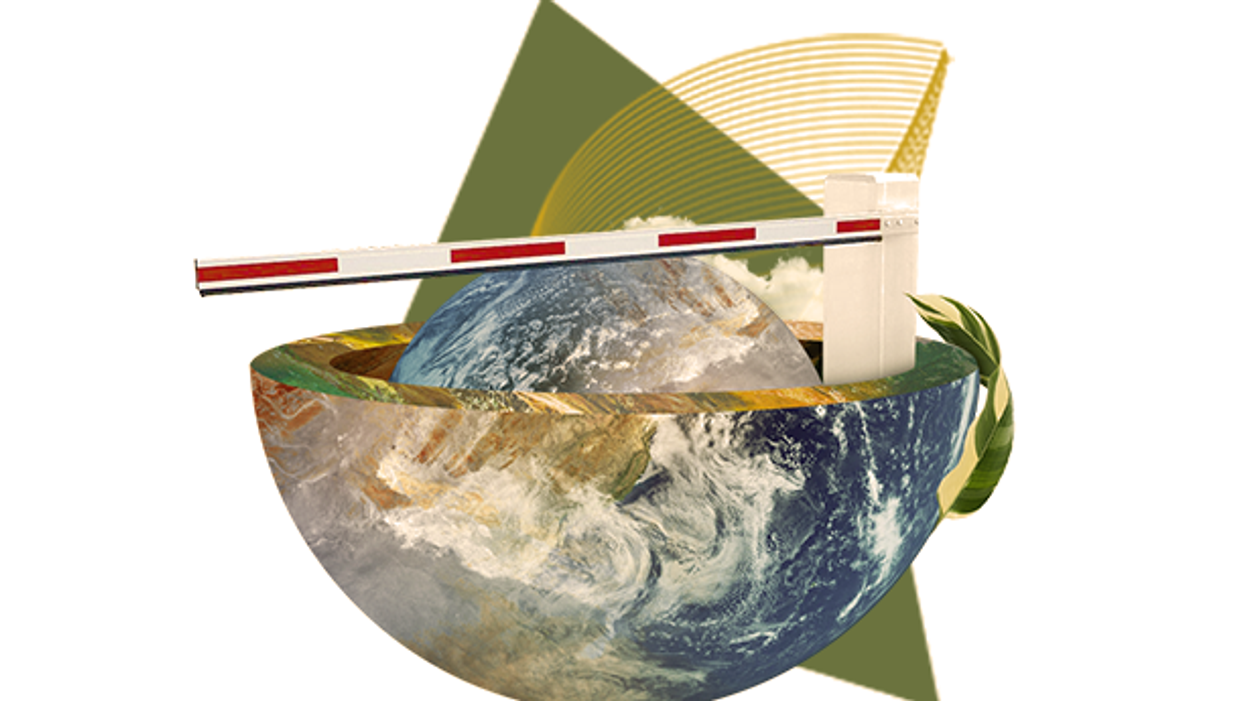
Episode 3: Has globalism been canceled?
Transcript: Season 1, Episode 3: Has globalism been canceled?
Meredith: Welcome to Living Beyond borders, the podcast from Citi Private Bank and GZERO Media that examines the risks and opportunities in our rapidly changing world from global politics to economics and what it all means for you. I'm Meredith Sumpter, head of research strategy at the Eurasia group. And today we're taking a look at two worldviews that on the surface appear to be totally at odds, globalism and nationalism. In the late eighties, as the cold war had finally thawed walls were coming down all over the world
Media Clips: Are the East German authorities have said in essence that the Berlin wall doesn't mean anything anymore. So as China becomes a member of the WTO as China to, uh, embraces the multinational rules of, uh, international trades, I think everybody stands to gain from China's membership. The free market enables people to buy in the cheapest market around the world. If they fail, they bear the cost. If they succeed they get the benefit.
Meredith: Advocates of globalism promised free trade, open borders, and a boost for the middle class, both in emerging economies and here in the U S
Media Clips: With the new economy, powered by technology nurtured by the ingenuity of the human mind, enlarged by our new found fiscal discipline at home and increasing trade among all nations. The American dream is clearly within reach for more and more American families.
Meredith: But as corporate profits, soared workers, weren't seeing as many benefits and it became harder for many families to make ends meet their frustration, grew.
Media Clips: fair trade it's. It's not a perfect system, and it's definitely not a magic wand that can fix all the world's problems. Agriculture is upside down. And now of course, this week we have auto workers on strike. So none of those things fare well for the steel business prices are just tumbling every day, lower, lower, lower.
Meredith: slow to no growth and income, a lack of upward mobility and an ever widening chasm between the rich and the poor have sparked populous political movements in countries all around the world, calling for walls to come up once again.
Media Clips: Build that wall build that wall.
Meredith: with the world now facing an unprecedented crisis. One that has closed borders, disrupted supply chains and really risk toppling markets. We're examining the future of globalism. I'm joined by Ian Bremmer, president of Eurasia group and GZero media.
Ian: Hi, happy to be here.
Meredith: As well as Dr. Catherine Mann, global chief economist at Citi group.
Catherine: Delighted to be with you.
Meredith: Thanks to you both for being here. I'd like to start by pointing out that Catherine, you have global in your job title and Ian, as we all know your life's work is examining global politics. So let's get some opening thoughts from each of you on the current state of globalism and what factors are impacting it right now. Ian, let's start with you.
Ian: Well, globalism. Um, I see, as an ideology, uh, of, um, people around the world, leaders, both in public and private sector who, uh, claim that globalization more open borders, freer, and faster trade people, ideas, capital data moving faster and faster around the world, um, is not only the most efficient way to run the global economy, but it's also good for everyone. And that latter point is something that is being increasingly rejected, rejected by a lot of people who feel like they haven't been benefiting from globalism. And if you look at their quality of life, it's hard to say they're wrong and has also led to the election of a number of figures, political figures who, um, directly oppose, uh, globalism and attack it as an ideology. So I, I would say that globalism as an ideology certainly feels on the defense right now and feels like it's failing. Um, and, and that's a real problem for those of us who for the past decades have been counting on an increasingly free global market, uh, for our own well-being.
Meredith: Catherine, do you agree? Is globalism failing.
Catherine: Well, globalism isn't failing. What in fact has failed is the domestic policy response to the challenges of globalism. Um, in fact, most people never said that everyone would gain from globalism right away. And it is certainly the case that in the, in the retreat of the use of domestic policies to equalize across different sectors, different income levels, different genders, different races, domestic policies have failed to take the advantages of globalism and distribute it equitably within their societies.
Meredith: And so in many ways, in your view, it's the failure of governments and public policy to keep up with globalism and its impact on domestic societies.
Catherine: Well, I think that there are differences in views on, on how much there should be equitable distribution, uh, that, that is also an ideology. And as a result uh the pendulum has swung very far in the direction of an inequitable distribution of the fruits of globalism and of technological change by the way. So, it's not terribly surprising that the pendulum on the political front, which is the avenue through which citizens try to get, uh, advantages on domestic policy in their favor. It is not surprising that the pendulum has swung in the direction that it has.
Meredith: Have we seen these pendulum swings before?
Catherine: Certainly, um, there are definitely, uh, in the historical record swings from, uh, open, um, borders to closed borders. And one of the things that, uh, in the long sweep of history we have observed is, is that closed borders do not make for a bigger economic pie. And so the challenges of equitable distribution are even greater when you have closed borders and a smaller pie to distribute.
Meredith: That's really fascinating because I I am sure there are lessons we can learn from those past swings toward closed borders and being mindful of that. Catherine, what do you, what do you foresee for our policymakers moving forward? Do you think we're going to continue closing those borders or how long will these trend towards closed borders go before? There's a realization not only by the policymakers, but by the domestic populace who votes in those political leaders that close borders really fundamentally will not work for them either?
Catherine: Well, the closure of borders is a, you know, that's an extreme, uh, reference point, but what we can do is we can look at even over the last decade and examine the extent to which trade integration in good services and capital flows has already been on the back foot. Uh, it peaked trade integration and goods services, and capital flows peaked more than a decade ago. And it's also more than a decade ago that productivity growth, stalled and inequality started to rise. So there's an extended lag between what we observe in terms of global integration and what we observe in terms of, uh, political response. So, uh, this, uh, this particular pendulum swing, uh, could change, could change dramatically, uh, depending on the outcome of the election.
Meredith: Um, so Ian, Catherine has you know, spoken about this lag in terms of a peak of a global integration and the political response. And so, you know, of course, 2008 gave us a financial crisis, but it was also a moment of robust global cooperation politically that really helped us quickly overcome that crisis. And that is really very different from what we're seeing right now, what happened in those 10 years to have caused those alliances to, to devolve so quickly. And, and what does this mean for globalization moving forward?
Ian: I think we have to ask just how robust the political cooperation really was in 2008. Certainly all of the major political leaders in the world understood there was a very serious problem and they needed to respond to it. They wanted to avoid it, getting worse, falling into a depression, and indeed the creation of a G20 at the head of state level. Um, and particularly in April, 2009, that one summit we had in London, um, I mean, it felt like it was a moment where all of the leaders, they signed a communique, they were saying the right kinds of things, but was there really underlying global cooperation?
Ian: I mean, you know, the Chinese were not at all convinced coming out of 2008 that the United States free market system and the regulatory policy around it was something to bet on longterm. And you could make the argument that the seeds of China's belt and road, the seeds of strengthening their betting on state capitalism and technology, as as a strategic sector actually came out of 2008, 2009. But it it's certainly true that over the past years, over the past decade, that the alliances have devolved very quickly. And I think they've devolved for two reasons. Meredith, um, one is because inside our own Western democracies, there are fewer people that are committed to maintaining a U S led global order. There are a lot of Americans that say, why, why are we supporting this? What is it done for us? What does it meant to us? Why are we putting money into NATO? I mean, why are we putting troops in the middle East? Those were a lot of policies that both Donald Trump and say Bernie Sanders, uh, polled very well on, uh, when they, when they put them forward and the political establishment doesn't have a lot of support. That's how you got Brexit. It's how you got the United Kingdom, this special relationship we used to talk about between the United States and the United Kingdom, and suddenly they're not a part of the European Union anymore. It's how you got Europe feeling more divided internally because of the antiestablishment sentiment inside. So many of those countries in France and Italy across all of Eastern Europe. So that's a piece of it. And the other piece of it, um, is that the Americans have mishandled Russia. Um, you know, after the Soviet union collapsed, there wasn't really an effort by the United States to rebuild Russia and truly integrate them into American led international architecture. And so the Russians in decline got really angry at the West and are now doing everything they can to undermine the transatlantic relationship, as well as the legitimacy of our political institutions.
Ian: And then finally this Chinese piece where not only was there a lot of questioning of, for how long the US led model was really suited for purpose for the Chinese, but then Xi Jinping becomes president. And indeed he's by far the strongest leader that China has seen since Mao, and he is much more willing to be publicly assertive about Chinese global leadership aspirations in a way that previous Chinese leaders had not been, had been very loathed to. And, uh, that, that, uh, in, in, uh, you know, as you see playing out in places like Hong Kong and Taiwan in the South China Sea in technology, in belt and road, and in, in Xi Jinping's getting rid of his own term limits so that he could potentially be leader for life, a la Putin, uh, effectively in Russia. All of those things I think are important as we talk about the story of how the US led alliance system has started to unravel since the financial crisis of 2008.
Meredith: So with that unraveling of a system that existed in 2008, Catherine, are there lessons that we can take from the way that 2008 crisis was handled that applied to this conversation today?
Catherine: So I think it matters to kind of review the evidence, you know, first what was happening over the last decade from the standpoint of economics, from the standpoint of what businesses were doing, what consumers were doing, uh, what investors were doing, um, as well as some political backdrop as well. I mean, cause, uh, that they, uh, politics, uh, design the rules of the game. So the first thing of course is that there was a lack of commitment to opening markets. Uh, and many economies, uh, were retreating from marshaling, their domestic policies to enable the transformation of businesses. So we already were on the back foot with regard to domestic policy, uh, even after the financial crisis.
Catherine: Um, you know, the second issue over the last decades, uh, was, you know, emerging markets were growing as a share of trade, but they were not playing their fair share, so to speak or a commensurate share of their GDP, uh, in terms of participating in market opening and trade liberalization efforts. Uh, so they were getting a bigger chunk of the pie, but they were kind of free riding on it, uh, the services rather than goods, again, growing as a share of trade, but restricted in a lot of markets. So that's really the backdrop, uh, to, um, the financial crisis. Uh, what have we learned, you know, since then, um, what lessons did we learn about, uh, the last decade? Let's talk about the real side first, um, you know, after the financial in 2008 business investment stagnated and labor markets were very slow to recover growth, ultimately did resume to the pre crisis trend, but at a loss of about 5% of global GDP relative to what that trend had been, uh, prior to the crisis.
Catherine: So, you know, after 2008, there actually was no recovery where, what we mean about recovery is you recover the losses associated with the financial crisis. We did not do that. So the lesson is who bore the burden of that loss, the younger cohorts, in other words, younger generations do not have the same lifetime earnings trajectory as their parents. So when their parents say, I don't think my kids are going to do as well as I did, they're absolutely right. Our emerging markets overall grew more slowly. Why? Because they saved all their international reserves rather than investing in human and physical capital. Cause they were so worried about the next financial crisis. And then thirdly, of course, within cohorts, within a generation well-documented increases in inequality, hollowing out of the middle class financial vulnerabilities. So this is what we know from the data post GFC financial crisis.
Catherine: My concern is we are seeing a repeat of this movie. Again, the data are starting to show a rebound from these terrible contractions, but there's a collapse in business, investment erosion of the capital stock, longterm unemployment labor market scarring. The forecasts that we have at Citi is we project a loss in global GDP from where we were just January, this year, about four to seven percent. So the issue is, you know, who's going to bear that burden. Who's going to bear that burden, uh, because if there's a loss, you bear the burden. So the second point though, about the financial crisis and where we are now is, you know, 2008 was a financial crisis. This one's a pandemic, but I think a very important question is could the pandemic get exacerbated by a financial crisis in 2021? Let's think about how that might happen, right? You have a dramatic increase in liquidity, which was a very appropriate response to the pandemic initial cost or initial hit in earlier this year. But the response to that has been a huge issuance of public and private debt. And of course, equity markets that, that hit at least the US equity markets that continue to hit a major highs. So is that setting us up for a financial crisis in 2021, which is going to exacerbate the, uh, challenges of recovering from this pandemic in 2020?
Meredith: Yeah. And, and really the, The pandemic effects and rising inequality. Ian, do those two trends make the rise of nationalism that we are seeing now an unstoppable trend in the near term. And if so, how should we expect global leaders to respond?
Ian: Uh, I wouldn't necessarily say an unstoppable trend in the sense that we see it everywhere globally, equally, but certainly the acceleration of inequality. Um, the dangers of how you do pay for, um, all of the extraordinary relief that has necessarily been provided, um, is going to lead to a lot more people that feel aggrieved that feel like their institutions don't represent them, that their democracies aren't really representative. Um, that was how, of course you got Trump in 2016. Um, and it's, uh, that's only going to grow, um, in countries that have been unable to use this crisis, um, to actually address, uh, how the social safety net in their countries has so badly frayed and eroded over the past generation and more, um, I think there are some leaders that are taking advantage of that. You look at Angela Merkel, who in Germany, who was, is at the end of her tenure.
Ian: Um, her, uh, her legacy was shot before the pandemic with very low popularity with, uh, growing anti-establishment sentiment in her own Germany, uh, particularly in former East Germany, um, and unable, uh, to, uh, to, to even ensure that her own preferred successor was going to be able to take over her party after she was gone. Now just a few short months later, she's by far the most popular leader in Germany. And dare I say, even in Europe, because she's responded the pandemic so well, and she's using that to actually redistribute wealth from the wealthy North to the countries, particularly in the South and some in the East that really need it. And that is taking away some of the urges of nationalism and Euro skepticism in Europe. So Meredith it's not as if the less, it's not as if this crisis means that everyone is going to continue to just head down a nationalist path. There are true opportunities that come from a crisis of this scale, this, uh, severity. Uh, but if you ask me in the United States, do we look like we're going to learn those lessons or will nationalism grow? I fear you're not going to like answer.
Meredith: That's absolutely right. And it echoes back to what you and Catherine have been talking about that pendulum swing between open and closed borders, or another way to think about it is that balance of globalism and nationalism. Catherine you've, you've written and spoken about this a lot. And there there's an assumption among policy experts that globalism and globalization is good for national economies. And thus nationalism is bad. Is this indeed the case? And if it's not, why is globalism versus nationalism a false choice?
Catherine: So I think the way, uh, you started, which is, uh, you know, everybody thinks that globalization is good and therefore nationalism is bad. It really does set up this sort of dichotomy that it's an either or, um, and it, it really isn't an either or, uh, they're, they're two horses that working together, move the cart forward. Uh, so how does that work? You know, globalization, uh, you know, increases the size of the pie. We, we can look at all of the different ways in which it does that in terms of, uh, technology transfer in terms of opening markets, in terms of creating higher quality in terms of greater variety, reducing prices, you know, uh, the, the, the, the range is, is really extreme in terms of how globalization increases the size of the pie. Nationalism, or I would say policies that are promulgated in the national interest, enhance national competitiveness so that your business and citizens can be part of this growing pie.
Catherine: So that's, you know, complimentary globalization, national nationalist nationalism are complimentary by making your business and citizens being, you know, part of the part of the, a team, um, but more important. And I think this is the part that has been lost is again, I get back to the policy decisions to ensure that the divvying up of the pie is more equitable. Uh, increasingly we can talk about, and I mentioned it already, the extent to which, uh, policy decisions have failed to divvy up the pie equally, uh, within economies, um, across different kinds of businesses across different sectors, across different individuals, across different cohorts in terms of ages, um, and so forth. And so when you have this degree of, uh, inequality across a range of different metrics, you do have negative consequences for growth. You do have negative consequences for being able to participate in this growing global economy.
Catherine: So these two, um, strategies, globalization and policies in the national interest are complimentary. It's both a strategy a mindset. You have to believe that globalization is good to increase the size of the pie and policies in the national interests serve to allow your economy, uh, people in your economy and workers in your economy to take advantage of that. So it's a strategy and a mindset, both promote, uh, national growth. Uh, so growing the globalization pie, divvying it up, uh, to make sure you get a growing slice of that pie are working in the same direction. They are not a false dichotomy. It's, it's not, uh, incompatible, it's not a false choice.
Meredith: And so really the rise of nationalism and the growing inequality, it goes back to what you were saying earlier, Catherine, about the, the policies to ensure more equitable distribution of the gains of globalism reaching segments of the population that have felt left behind that's where we've been failing.
Catherine: Right. I mean, we've been failing in, you know, we have been failing them directly in that yes, they have been left behind. I mean, that is true. Uh hollowing out of the middle class inequitable distribution of wealth, which is only exacerbated by a financial policies that promote wealth, the wealth creation. Um, so they have been left behind it. It's absolutely true. But what I'm saying is it's even deeper than that policies in the national interest that create a greater equality, also enhance national growth. So it's not just sort of some kind of moral thing. It's actually in the growth interest to have these policies, to ensure that the global pie is widely shared within the national economy.
Meredith: Ian we've got this global pandemic it's not going away anytime soon, unprecedented economic upheaval that is coming with it and citizens who are pressing their governments to put walls up, to protect them. In this environment, will nationalism be more or less effective and ultimately protecting people's interests?
Ian: Well, let's be clear everything we have just been talking about, um, uh, about the benefits of globalization, a pandemic doesn't help that, right. I mean, you know, you're, you're talking about people not traveling. Uh, you're talking about quarantines and lockdowns. Um, you're talking about social distancing. Um, you're, you're talking about supply chains that have been disrupted and as a consequence, people trying to find ways to make their supply chains more resilient, as opposed to just in time more efficient. All of those things are the opposite of globalization. And, um, I think that there is going to be a natural recalibration, uh, that as a consequence of this massive shock, um, that will create less efficiency just as we all rushed to learn the lessons of the pandemic and forget other lessons, right? Because this is a war against coronavirus when you're fighting a war, anything else?
Ian: The war on terror, the war on drugs, anything that anyone says that feels like it's, well, what about these other issues? They're important too. It makes you anti patriotic. It makes you anti nationalist. Um, and so that does create more of this false choice as Catherine was saying, but a politically expedient, one between globalization and nationalism and one that many politicians around the world and not just Trump, uh, certainly both scenarios, certainly Boris Johnson, certainly many others have abused for their advantage. Um, I going forward, uh, there also is going to be a lot of political demand that as you are bailing out, lots of corporations that desperately need support to continue to function. What's the conditionality. I mean, if taxpayers are going to give billions and billions of dollars, and a lot of those taxpayers are angry that you haven't been giving them opportunity, their benefits haven't kept up their wages haven't been kept up. They're going to demand whether it's efficient or not. That the conditions of you making those bailouts will be greater walls, even if that's very inefficient for everyone longterm and leads to a smaller pie and less growth in the near term. I mean, in the same way that the farmers have gotten a lot of money on the back of the, uh, the US China trade and tariff war longterm, it's not good for US ag, but short term. It's great for those farmers. At least they know the next electoral cycle. I think you're going to see a lot of that and not just in the United States all over the world. And that's something that we're going to have to watch very carefully.
Meredith: Great perspective. Catherine, let, let's go back to you. We have some economists that are making the argument that we're at peak globalization, that there really isn't many more ways for our global economy to become even more interconnected. Do you agree? And what do you think this next phase of globalization looks like as we are dealing with this tension between the global and the local?
Catherine: So the comment that Ian was making, um, from the last section about how COVID is ushering in a new period of, uh, supply chains that are going to be, you know, drawn in, uh, either, uh, by demand, by fiat from governments or, uh, businesses kind of, uh, looking at the political winds and that this is going to imply lower efficiencies, higher costs, and a lower, uh, you know, a smaller global pie that is certainly one, uh, vision of, uh, a post COVID world. But, um, I think that there is another vision, and this is one where we, we do have, um, increased global integration, uh, but it has, uh, more nodes to it. In other words, uh, more players are involved, more countries are involved, more companies are involved. And the supply chains, if we think of supply chains as being a particularly important, uh, manifestation of globalization, um, a much richer type of supply chain. And let me tell you what the, what the vision that I see. I think this next phase of globalization is how a firm, how firms and, you know, firms play a really big role here in globalization. Um, how firms approach a reconfiguration of their supply chains. Now, part of this is definitely on account of COVID, um, and some of the politics around COVID, but firms have been looking at reconfiguring their supply chains for a while.
Catherine: Uh, we can think about, you know, uh, Fukushima. We can think about Rana Plaza. We can think about the Thailand floods. We can think about Harvey. These are all what used to be called tail risks. Like didn't happen very often, so you didn't have to worry about them. Um, but now we have COVID, we had a US China trade war. We have, uh, technology concerns. Um, and so what is happening to supply chains and firms are looking at this, they're saying, you know, things that I thought were just, uh, occasional disruptions, I have to incorporate these possibilities into a much richer view of what my supply chain is going to look like going forward. And of course the ultimate, uh, redirector or reconfiguration of supply chains is about climate. So the question is how do firms respond to the demands from consumers and businesses for transparency and visibility into the supply chain partners for ESG reasons consumers want to know, uh, there's also Dodd-Frank and conflict minerals that businesses have already been working with. So supply chain transparency and visibility is one new, uh, key dimension of the reconfiguration question for firms and their supply chains. The second is diversification, and indeed, perhaps some localization of production. In other words, firms have been looking at their supply chains and said, you know, we have too many eggs in one basket. Um, even if it's a big basket, uh, and we need to think about diversification. Some of that has to do with maybe indeed some political pressure, but also there's just pressure coming from the realization that tail risks, these disruptions come fast and furious, and you have got to have a diversified, uh, production location in order to deal with that. And then the third dimension about reconfiguring supply chains is a really important ingredient going forward is firms have to be flexible.
Catherine: So it doesn't make any sense to have multiple production locations. If you don't have flexibility to move production around in the case of various risks, whether these come from climate or from politics. So these three dimensions that um create a much, a much richer set of challenges for firms to reconfigure their supply chains. Now, does this imply higher costs? Less efficiency seems like it would, it seems pretty obvious that it would, but in fact, that's not true. The key is to have the underpinnings of information technology, uh, as the and the information flows associated with that, that, that allow firms to talk with each other, to create this transparency, uh, to, uh, build on the diversification, uh, and to create the flexibility. So information technology is, uh, the way out here to, uh, increase the, the, you know, to allow supply chains, to have the same sorts of efficiencies, but broadly defined to include these other dimensionalities efficiency is not just about a cost.
Catherine: You can think of it in a broader set of terms, the transparency, visibility, diversification, localization, and then flexibility. So we get to the dimensionality of globalization, which we have not talked about enough, I think, and that is digital information and technology and the potential for the fragmentation of, uh, globalization of digital information, uh, technology platforms that is potentially the greatest cost to a reconfiguration of global supply chains that retain all of the benefits, but have much greater richness to be responsive to a shocks as they go forward.
Meredith: Yes, and this all comes at a time when we are at this juncture where the onward path of globalization depends upon the ability of firms to find greater efficiencies and to incorporate more of digital technology and how they, how they, uh, invest in an operate, their supply chains and their operations globally. This is coming just at the time when we have major global tech leaders, comp, uh, countries, uh, at odds with each other about how that tech infrastructure should operate globally, a fragmentation, if you will, how do you see that intersecting with, with plans for onward globalization?
Ian: Yeah, the technology piece is no question, uh, where we're heading that is most directly at odds with continued globalization. Um, I have no doubt in my mind that no matter where US China relations go in the next five years, if you go to a Walmart, you're still gonna buy an awful lot goods that are made in China. I have no doubt in my mind that if you go to a mid level college or university in the United States, there's still going to be an awful lot of Chinese students paying full freight for tuition, and that's going to help to keep those universities and colleges afloat financially. So there is a level of integration between the global economies of the world, and most importantly, between the two largest economies in the world, the United States and China that will persist even as the Chinese become the largest economy in the world.
Ian: And even as they refuse to align with a lot of American standards of governance and markets, but on technology, we are clearly heading into an environment where there will be a Chinese system and a US led Western system in terms of the development of applications, in terms of the rollout of five G in terms of the cloud, and perhaps most worryingly in terms of the human capital, that goes into all of those things. I mean, fundamentally globalization is really about humanity, taking greater and greater advantage of our collective human capabilities and knowledge. And the technology cold war is a direct spike into that. It means, yeah, is that some of the brightest scientists in the world will increasingly be working at cross purposes to each other. It means that the development of artificial intelligence will feel more like the, the cold war, a more zero sum relationship where our companies want the Chinese to lose.
Ian: And our national security is oriented towards that. That's the direction we're now heading. I don't believe that it's inevitable that we're going to continue in that direction the next five years, but it's certainly possible. And if that continues, uh, it, it means that, um, you're going to have two different sets of data, two different sets of internet, of things, two different types of surveillance regimes. And you're going to have human beings speaking different kinds of languages. You know, I mean, these algorithms that affect the way we think the way we get information, that our kids are spending all their time on their virtual phones and their smartphones and devices and in their virtual worlds. And as that moves to the internet of things, and we talk about anything with a chip in it. So the data ecosystems around us as human beings, beings, if we split that into two, then we are to a degree splitting humanity into two. And I, I would argue that that's quite a dangerous thing to be doing globally. It's of all of the things we're talking about here today, Meredith that's probably the one that I am least sanguine about.
Meredith: Certainly the the technology cold war is frustrating, a cohesive deepening of globalization that Catherine has spoken about just at the point when we need our political leaders to be focused on that, that road ahead. So, Ian, how do you talk about this next phase of globalization with political leaders and what this means? Not only for their economies, but for their societies.
Ian: I try to do two things. Number one is I try to help ensure the focus is that these are global problems. They're not national problems. I mean, no matter what we do about a green new deal in the United States, if our solutions don't address India and China, who will be emitting vastly more carbon over the course of the next couple of generations than the Americans will, then we're going to fail. And that failure will affect all of us that will affect the global economy. So there needs to be global solutions. And this is so obviously true. When you think about the pandemic on the back of the Trump administration saying that we're not going to participate with the world health organization, with the rest of the world and trying to develop and distribute a vaccine. It's pretty obvious that has great global costs and that some of those costs will be born right here in the United States.
Ian: So that's the first thing I would say. But the second thing I try to do is I try to talk to leaders and explain, this is not about the failings of the leaders. I mean, whether you like Trump or Biden, whether you like, you know, sort of Merkel or Johnson, it's, it's not because these leaders are so bad that we have these problems rather it's that we created institutions and architecture that were very aligned with the power balance and the needs of humanity at the time they were created. But institutions by their nature are very sticky. They don't change very much or very quickly, but the needs of society do change. And that's not anyone's fault. It's a cyclical reality, but here we are. So I think to the extent that you can, when you're talking to leaders, you can take the narrow politics out of it. You can take the blamesmanship out of it. Instead, you can talk about the commonality of these issues. That look, that's how we ended up with cooperation between Gorbachev and Reagan, that brought us a few steps away from blowing each other up with nuclear weapons. And, and I think those are the kinds of conversations that we need to be having in 2020, and going forward to take a few steps away from the climate, um, and pandemic and, and other true existential global challenges that we all collectively face today.
Meredith: Catherine, you've spoken on this show about finding a healthier balance with the competing forces of both globalism and nationalism. How, how can investors adapt to this next phase? How do you speak with your clients about how they should prepare for where globalization is heading next?
Catherine: So I think we first, uh, have investors. Of course, who've got a sort of immediate questions about, um, you know, how should I invest, uh, the funds that are entrusted to me and, uh, you know, so they have a very short term, shorter term focus on, you know, what the fed is going to do or what the ECB is going to do and so forth and so on. But, um, if, if for those who have a longer term objective, who, who, um, are addressing, uh, these issues for a longer term, I think there are a couple things. First. I talk with investors about what it means to have lost GDP and how that burden, uh, affects their bottom line. Uh, if you have a younger cohort who is not going to have the same type of opportunities to, uh, have a higher income, to be able to, you know, buy stuff, a house better life and build wealth, then that means the investors, uh, assets under management, uh, are, are going to be looking worse going forward than they think.
Catherine: Um, so it, this notion of lost GDP is a very important one. Um, it also means that, um, the balance between sort of the real side economy and the financial side of economy becomes further and further disconnected from one another. I mean, we talk a lot about main street and wall street, right? That's a, that's a standard, um, metaphor for thinking about this disconnect that we, that we have observed and are increasingly observing between what's going on in the real economy with regard to business investment, with regard to employment, with regard to inequality and, and in globalization as well. Uh, and then what's going on and what, and what the financial markets are doing. And so the concern that comes up from the standpoint of investors is, you know, that disconnect is in part maybe even in large part being supported by a central bank intervention and has been supported by central bank intervention. And how long can that go on? Is that infinite? Is that an infinite play, uh, that it can go on, uh, and thus they, the financial markets and the real economy can be disconnected forever. Um, I bet I'm betting no. That th that there will be a, there will be a time of reckoning when the two mar, when the two sides of the coin have to, you know, come back to each other. And of course that means something for how investors position themselves, uh, to, to, uh, be on the right side of that, uh, that adjustment when it comes. So, you know, it's both a short term issue, as well as a longterm issue, um, that I discussed with investors.
Meredith: So last question, and let me pose it to you first, cause I I'd love to hear your thoughts on how you are talking with maybe even nationalist leaders, um, about this concept, um, who are facing angry societies, uh, who feel left behind and want them to build more walls. So when you're talking to them Ian, what do you say when you're expressing to them, to these political leaders who are feeling pressure to build walls? Why is it important that they remain global, that their countries remain global even as they are adhering to pressure to find ways to address the concerns at the local level?
Ian: Well, I think it's easier to do, um, with the private sector than it is with many, um, political leaders in place today. And the reason for that is because all of the arguments for going global, um, not only do they need to be implemented effectively, but they're longterm, they're longterm arguments. It's so much easier to respond tactically than it is strategically when you have populations that are hurting, um, and they want to lash out. Uh, and so look, I do think that if Trump had run on, um, a more, uh, pro globalization agenda, he wouldn't be president today. And he knows that, right? And I don't think Boris Johnson would be prime minister if he hadn't stirred up the pot for the Brexit referendum, even though I don't think that's in any way good for the interests of the British people longterm and even the United Kingdom staying together.
Ian: I think it's more likely that eventually Scotland will leave. And perhaps that means that Ireland eventually reunifies and it's, you know, the Europe is weaker. I mean, this is all flying in the face of everything that we've been saying over the last hour. So I mean, the fact that we can sit here and we can have very polite conversations about why it would be better if our political leaders did X. I also think we need to have an honest understanding that the political leaders aren't necessarily always focused on the longterm interests of society. And when you get a misalignment of that, when you get politicians who see short term opportunities in addressing narrow grievances of people that have been ignored and mistreated for a while, that's when you have the greatest dangers that politics and economics and that globalization and nationalism will become the two sides of a coin. That's a problem.
Meredith: Catherine, I'd welcome your thoughts on what Ian just said and how you think about both the political pressures that leaders are feeling to go local as well as when you look ahead, how long will it be until you think that country economies will find that new balance, and we'll find a path towards that deepening globalization that works better for main street, even as those political leaders are also paying new attention to those concerns at, at the local level.
Catherine: Well, I think we have to examine, um, this notion that political leaders who are elected, uh, because of their rhetoric with regard to the disenfranchised and compare that with the policies that they have put into place, because in some cases, perhaps in many cases, uh, the policies put into place further disenfranchise, exactly the people who elected the politicians, whose rhetoric they listened to, but the policies make their lives worse.
Catherine: Um, and so that is my concern that people aren't don't want to see the tension between, well, the rhetoric is, you know, is, you know, the rhetoric is on he's on my side, but the policies he's not on my side, that's a really tough equation for individuals to deal with. So the enlightened politician, uh, recognizes that you can make people's lives better and be global at the same time. The question is, how do you, what rhetoric we, I think we know what the policies are. Okay. This is not a policy problem. We know that they are, they're not easy to implement, but you know, we know what they are. How do you use the rhetoric to get to a position of being able to implement the policies that will be both global as well as in the national interest? I think that's the real challenge.
Meredith: It certainly is. Dr. Catherine Mann and Ian Bremmer. Thank you for being here and for sharing your perspectives.
Ian: My pleasure.
Catherine: Thank you very much.
Meredith: That's it for this episode of Living beyond borders, stay with us this fall. As we look at the biggest issues impacting your world and your money from US China relations to the future of cities, sustainability, the upcoming US election, and much more. For Eurasia group, I'm Meredith Sumpter. Thanks for listening.
















